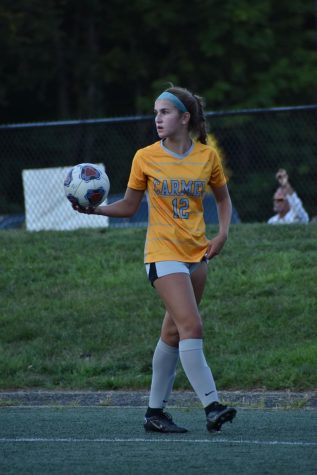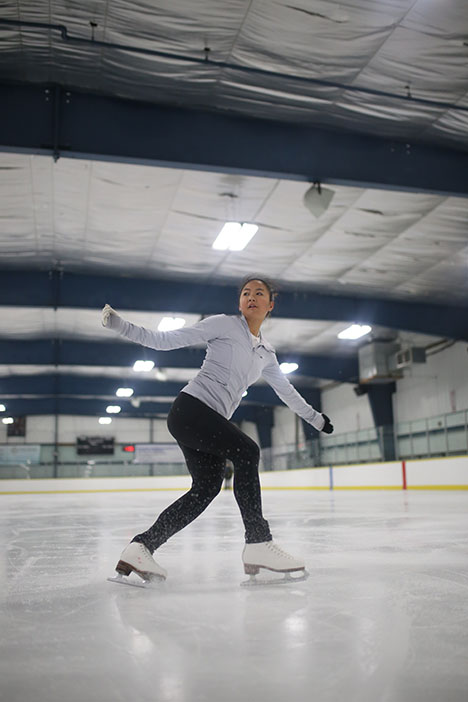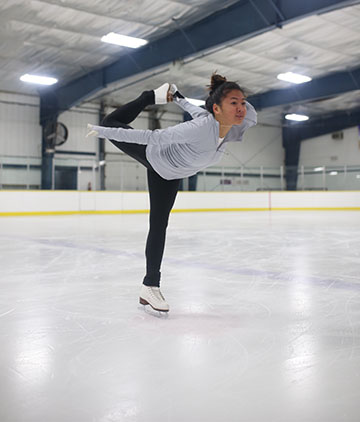CHS is home to some of the most talented ice skaters in the region.
For most teenagers, skating on a Friday night at the Ice Skadium is about winding down after a long week of classes. Others use the opportunity to meet new people and reconnect with old friends.
However, for junior Angela He and senior Alisha Wang, the common pastime has evolved into much more than just an after-school activity, but as a passion to showcase their skills on the ice.
“I first skated when I was seven,” He said. “My parents encouraged me to (skate) after I skated on a frozen pond, and they told me I should get good at it. When I was just starting out, it was just for the fun of it with my friends, but the further I progressed, it became more serious to me, and I wanted to keep getting better.”
Wang also began skating when she was young, at age six, and spends 15 to 20 hours weekly on the ice practicing.
“I typically skate everyday, before and after school,” Wang said. “A lot of hard work goes into it, and it truly is a year-round sport. We always strive to be better than we were.”
Both He and Wang attribute their perseverance to be rooted in effective coaching. The two train with Marie Millikan, a former Olympic athlete from Czechoslovakia who competed in the 1968 Winter Olympics.
“She’s taught me a lot about growing up and being mature, like doing things for myself,” He said. “She’s always made me get back up and try again when I fall. Even when I know I’m going to fall, she makes me work through it, and that’s what has helped me succeed.”
In the off-season, He trains every day, except Sunday, with Millikan and has passed all but one test to place her in the highest level in youth skating. During the competition season, practices are everyday.
Similarly, Wang has participated in state and regional competitions, travelling to compete with other figure skaters.
“Alisha is already nationally ranked and is the best Indiana has to offer,” Millikan said. “She takes her skating seriously and has the potential to go far. However, skating is a volatile sport. In series of competition, points are accumulated that decide which skaters can advance to nationals, but you might have a bad day or a slip. This is why it’s hard to say if she’ll make the Olympic team, but she is very capable.”
Only the top few competitors qualify to move on to the national competition, where the top two advance to join the Olympic team.
“I start training for a competition at least two months prior. We begin run-throughs of the routine and work up to double run-throughs,” Wang said. “In competition, every jump, spin or other element has a certain point value that is determined by the International Judging System (IJS) that is universally used around the world.”
 This judging system is new to the sport as of 2002 and replaced the old “6 point system” used prior.
This judging system is new to the sport as of 2002 and replaced the old “6 point system” used prior.
“Competition has changed since I was in the Olympics,” Millikan said. “Following the 2002 games in Salt Lake, point accumulation is completely different and is similar to scoring in gymnastics or diving today.”
Each element in the rink is scored using a base factor. Competitors are then further evaluated on creativity, level of control, and choreography.
“There are definitely sacrifices that come along with the time commitment needed to skate at a high level.” Wang said, “It’s more rigorous than it looks – but that’s the trick to it.”
PHOTO GALLERY:
Your donation will support the student journalists of Carmel High School - IN. Your contribution will allow us to purchase equipment and cover our annual website hosting costs.




























![Keep the New Gloves: Fighter Safety Is Non-Negotiable [opinion]](https://hilite.org/wp-content/uploads/2024/12/ufcglovescolumncover-1200x471.png)
















































![Review: “We Live in Time” leaves you wanting more [MUSE]](https://hilite.org/wp-content/uploads/2024/12/IMG_6358.jpg)
![Review: The premise of "Culinary Class Wars" is refreshingly unique and deserving of more attention [MUSE]](https://hilite.org/wp-content/uploads/2024/12/MUSE-class-wars-cover-2.png)
![Introducing: "The Muses Who Stole Christmas," a collection of reviews for you to follow through winter [MUSE]](https://hilite.org/wp-content/uploads/2024/12/winter-muse-4.gif)
![Review: "Meet Me Next Christmas" is a cheesy and predictable watch, but it was worth every minute [MUSE]](https://hilite.org/wp-content/uploads/2024/11/AAAAQVfRG2gwEuLhXTGm3856HuX2MTNs31Ok7fGgIVCoZbyeugVs1F4DZs-DgP0XadTDrnXHlbQo4DerjRXand9H1JKPM06cENmLl2RsINud2DMqIHzpXFS2n4zOkL3dr5m5i0nIVb3Cu3ataT_W2zGeDAJNd_E-1200x884.jpg)
![Review: "Gilmore Girls", the perfect fall show [MUSE]](https://hilite.org/wp-content/uploads/2024/11/gilmore-girls.png)
![Review in Print: Maripaz Villar brings a delightfully unique style to the world of WEBTOON [MUSE]](https://hilite.org/wp-content/uploads/2023/12/maripazcover-1200x960.jpg)
![Review: “The Sword of Kaigen” is a masterpiece [MUSE]](https://hilite.org/wp-content/uploads/2023/11/Screenshot-2023-11-26-201051.png)
![Review: Gateron Oil Kings, great linear switches, okay price [MUSE]](https://hilite.org/wp-content/uploads/2023/11/Screenshot-2023-11-26-200553.png)
![Review: “A Haunting in Venice” is a significant improvement from other Agatha Christie adaptations [MUSE]](https://hilite.org/wp-content/uploads/2023/11/e7ee2938a6d422669771bce6d8088521.jpg)
![Review: A Thanksgiving story from elementary school, still just as interesting [MUSE]](https://hilite.org/wp-content/uploads/2023/11/Screenshot-2023-11-26-195514-987x1200.png)
![Review: "When I Fly Towards You", cute, uplifting youth drama [MUSE]](https://hilite.org/wp-content/uploads/2023/09/When-I-Fly-Towards-You-Chinese-drama.png)
![Postcards from Muse: Hawaii Travel Diary [MUSE]](https://hilite.org/wp-content/uploads/2023/09/My-project-1-1200x1200.jpg)
![Review: "Ladybug & Cat Noir: The Movie," departure from original show [MUSE]](https://hilite.org/wp-content/uploads/2023/09/Ladybug__Cat_Noir_-_The_Movie_poster.jpg)
![Review in Print: "Hidden Love" is the cute, uplifting drama everyone needs [MUSE]](https://hilite.org/wp-content/uploads/2023/09/hiddenlovecover-e1693597208225-1030x1200.png)
![Review in Print: "Heartstopper" is the heartwarming queer romance we all need [MUSE]](https://hilite.org/wp-content/uploads/2023/08/museheartstoppercover-1200x654.png)







